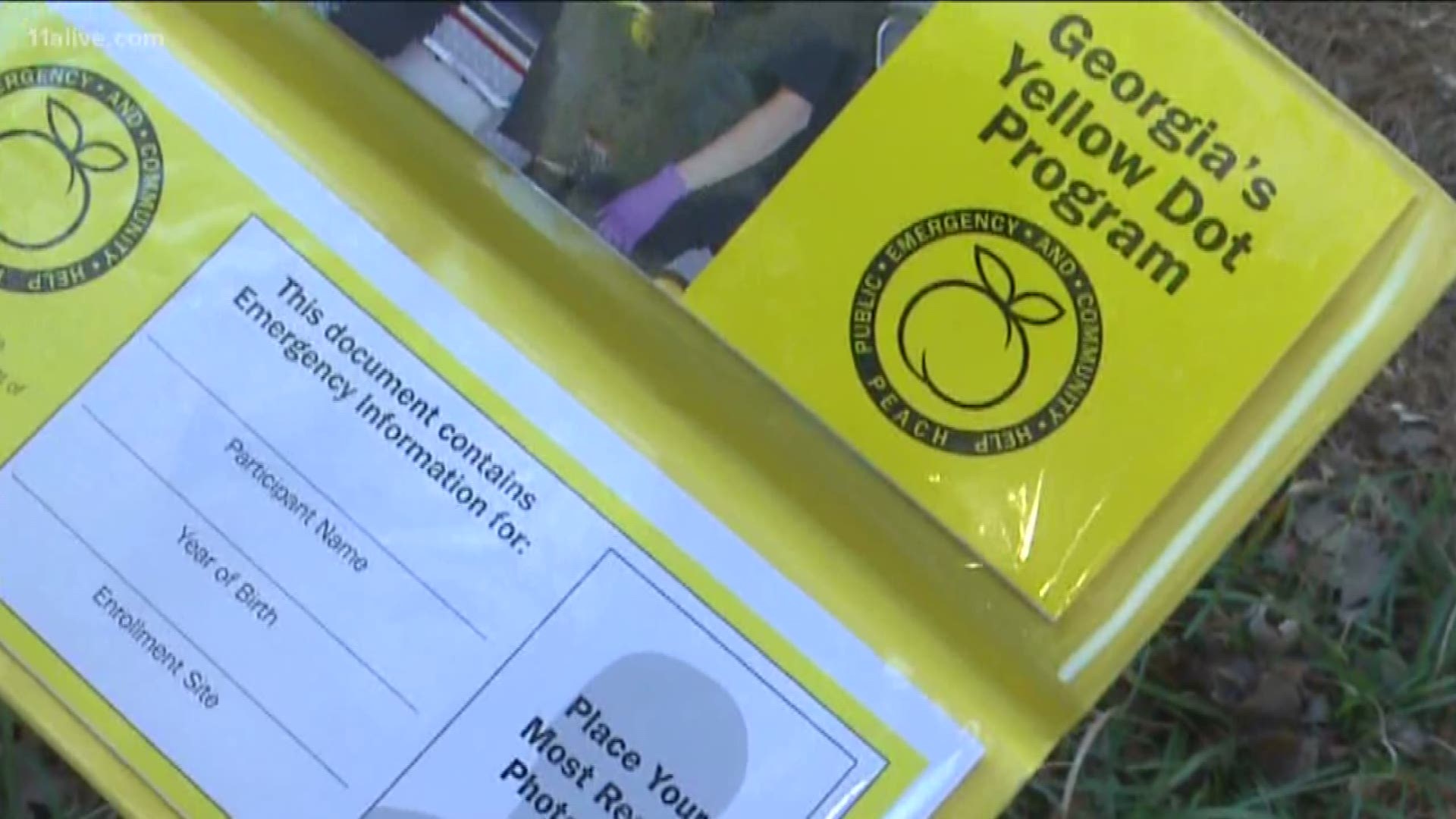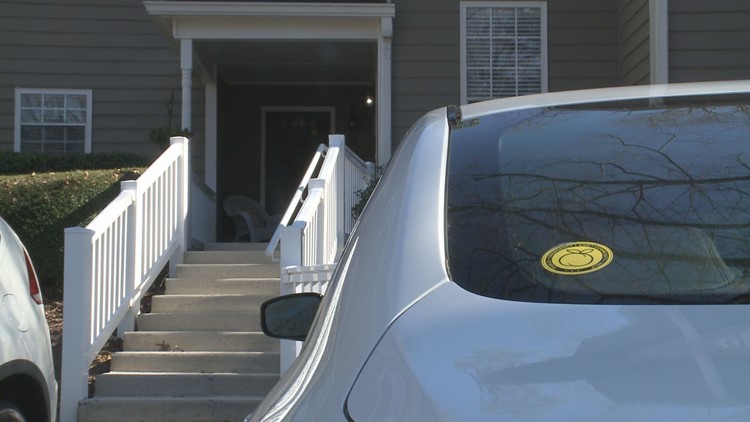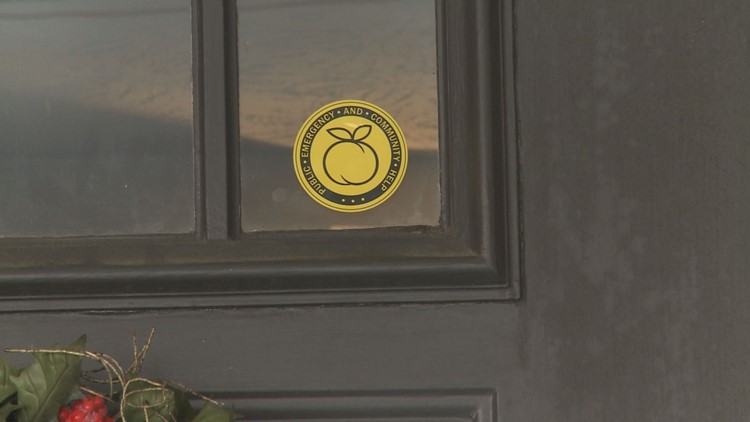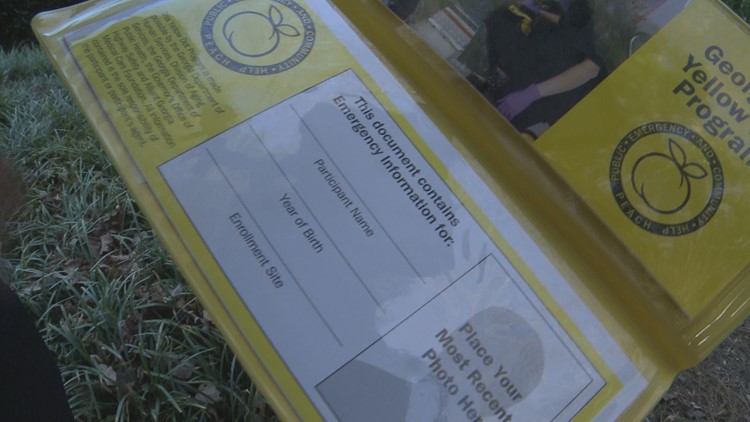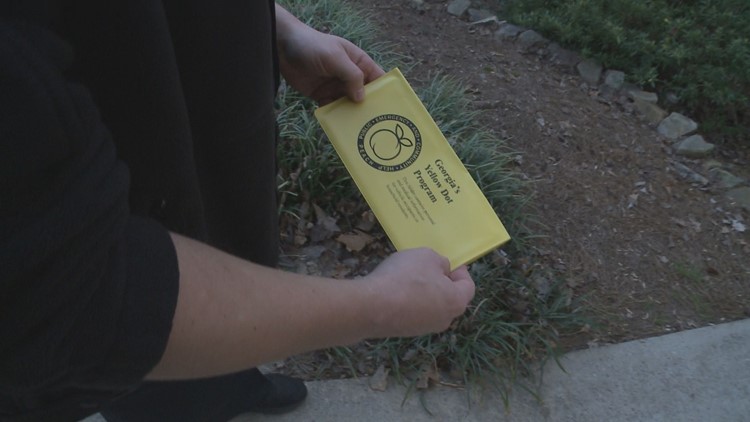DUNWOODY, Ga. — When a friend doesn’t show up for a party or appointment, it’s common to worry about their safety – but for loved ones with a medical condition, it can be a matter of life or death.
Last month, a woman having a diabetic emergency was saved thanks to a concerned friend and Georgia’s Yellow Dot Program. According to Dunwoody police, Melanie Howard's friend was worried after she didn’t show up at a neighborhood gathering late in the afternoon of Christmas day, and the friend could not reach her. The friend called, she went to her house and knocked on the door, but no one responded.
"I didn't hear the phone when my friends were calling, ringing the doorbell, none of that," Howard said.
She doesn't remember anything about that day, after she collapsed in her bed from what, she found out later, was a diabetic coma. She said that in the nearly 30 years since she found out she has diabetes, she had never had a problem living with it
The morning after Christmas, Howard's friend kept trying to contact her, and called police to do a welfare check.
Dunwoody Police Sergeant Robert Parsons said officers knocked on Ms. Howard's door, and there was still no answer. But they saw a small, yellow dot on her door. They also saw the sticker on her car which was parked in the driveway, and those stickers gave the officers all the information they needed to know: they knew to look in her glove box, where they knew they would find a packet containing all of her emergency medical information.
Georgia's Yellow Dot program is a way to provide first responders with someone's detailed information when that person is in a medical emergency and unable to speak. In Howard's case, the forms she had left for them told them that she was diabetic, which prompted police to force entry into her home and call emergency medical services to the scene.
"Had the officers not found that packet, they might not have ever gone into that apartment," Parsons said. "They may not have known the person that lived inside had medical conditions. So it was instrumental in our officers making the decision to go in and find the victim and get her some help."
Ms. Howard was transported to Northside Hospital for treatment, her condition so serious she says she did not come out of the coma for three days. She is doing fine, now.
The information she included on the form also told authorities how to contact her son at work, who was able to get to the hospital within an hour.
Howard said she found out later that when the first officer on the scene found the Yellow Dot packet of her emergency information, he was practically ecstatic.
"He went out of here proclaiming, 'I've got everything I need, I've got everything, she told me [on her information sheet] she's diabetic, I got her medications, and her son's number, I'll have him on the phone in a minute,'" Howard said.
"And now all of my friends want a Yellow Dot kit," she said.
Elizabeth Head, deputy director for injury prevention at the Georgia Department of Public Health, said first responders like the program because it helps them quickly retrieve information about patients during a medical emergency.
"I think, in this particular case, the officer was able to make a decision more quickly to get an ambulance on the scene," Head said. "They were able to ascertain that the patient had diabetes and that she very well may be in pretty significant distress."
Dunwoody signed on to the program this past September, one of eight communities in the state, so far, where the Yellow Dot program is available. First responders are trained in the program, then they provide the packets and stickers for free. People do not sign up, they simply obtain the packets, fill out as much information as they are comfortable sharing for first responders to see, and attach the stickers to their front doors and car windows. The packets of information go in the car's glove box and also on the refrigerator.
The program focuses on people 55 and older, or others who are medically fragile, but anyone can participate. The program is funded by three state agencies -- the Governor's Office of Highway Safety, the Department of Public Health and DHS Division of Aging Services.
Head said that anyone wanting the program for their own communities should contact their local governments and ask them to participate.
"We are thrilled with the possible expansion of Yellow Dot throughout the state," Head said. "For us, it is absolutely about the potential of saving a life, or improving care or improving response time and efficiency for first responders.... It gives [first responders] an extra tool in the field."
Georgia's Yellow Dot program
WHERE ARE THE CURRENT YELLOW DOT COMMUNITIES IN GEORGIA?
- Athens
- Augusta
- Dublin
- Dunwoody
- Oglethorpe County
- Savannah
- Tucker
- Winterville
WHO CAN USE GEORGIA’S YELLOW DOT PROGRAM?
Georgia’s Yellow Dot Program can be used by anyone but may be most helpful for:
- People with multiple or serious medical conditions
- Severe allergies
- Children with special needs
- Individuals with dementia or mental health issues
- Any medically fragile person
HOW DOES THE PROGRAM WORK?
A Yellow Dot sticker on the driver’s side rear window of your car, or the “triple tree” of a motorcycle, will alert first responders that vital health information is stored in the glove compartment or saddlebag of the vehicle. The stickers can also be used in the home by placing a Yellow Dot sticker on or beside the front or entry door, and placing the packet on the refrigerator.
WHAT IS INCLUDED IN THE YELLOW DOT PACKET?
A Yellow Dot sticker for your car or motorcycle; the Emergency Information Form and information about the program.
What’s on the Emergency Information Form?
- Personal contact information
- Name
- Address
- Primary language
- 2 emergency contacts
- Your doctor
- Your pharmacy
- Emergency contact information
- Medical history
- Medical conditions
- Major surgeries
- Allergies
- Other important information
- Your photo
- List of medications
People are free to fill out as much or as little of the form as they wish, depending on what they believe would be important and helpful for first responders to know in a medical emergency. They may also include advance directive, living will or POLST information and if they are an organ donor.
Learn more about signing up, if your community provides the program, on the Georgia Department of Public Health website.

